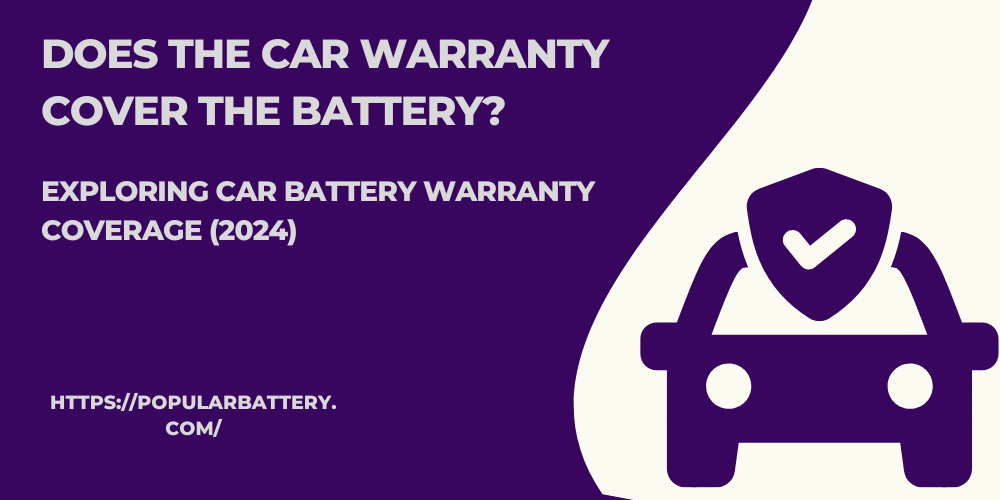Does the Car warranty cover the battery? Exploring car battery warranty coverage (2024). Are you planning to buy a car or already own one? Many drivers may not consider the type of warranty when purchasing their vehicles, and instead focus on the color, features, size etc. However, understanding what is covered in your car warranty can help save costly repairs down the line.
A car warranty is a contract between the manufacturer or seller and the buyer that guarantees the repair or replacement of certain parts within a specific period.
Keeping track of what components are included with your vehicle’s original warranty is essential for ensuring that both new and used cars remain in excellent condition for as long as possible!
What Components are Covered in Different Types of Car Warranty Policies.

There are three main types of car warranties: bumper-to-bumper, powertrain, and hybrid/electric vehicle warranties. Bumper-to-bumper covers most components except for wear-and-tear items, while powertrain covers only the engine, transmission, and drivetrain. Hybrid/Electric vehicle warranty focuses on the electric motor and battery components.
Does the Car warranty cover the battery? Exploring car battery warranty coverage (2024). What is a Car Warranty and Why Is It Important?

Step 1: Understanding the Importance of a Car Warranty
A car warranty is a promise from the manufacturer or dealer that they will repair and replace specific parts of your vehicle if they fail within a certain period. This gives you peace of mind in knowing that if any covered part fails, you won’t be bearing the full cost of repair or replacement.
Step 2: Types of Car Warranties
There are several types of warranties, including the bumper-to-bumper warranty (which covers nearly every part of the car), the powertrain warranty (which covers the engine and transmission), and the corrosion warranty (which covers rust and perforation). Each type has its specific coverage limits, and it’s crucial to understand these when purchasing a warranty.
Step 3: Understanding Battery Coverage
While a battery is a vital part of your car, it’s usually not covered under a standard warranty. This is because batteries are treated as ‘wear items’ that degrade with time and use, just like brake pads and tires. However, some manufacturers may offer separate warranties for the battery, especially for electric and hybrid cars.
Step 4: Reading the Fine Print
When purchasing a warranty, make sure to read the fine print carefully. This will tell you exactly what is covered, what isn’t, and for how long. Pay close attention to any exclusions or limitations and ask about anything you’re not sure about.
Step 5: Regular Maintenance and Checks
Regular maintenance and checks can help prolong the life of your car battery. These include keeping the battery clean and free of corrosion, making sure it’s securely fastened, and having it tested regularly. This can help you avoid battery failure, which can be inconvenient and potentially expensive.
What Does a Car Warranty Cover? and How Long Does It Last.

Step 1: Know the Types of Warranties
There are several kinds of warranties, including the manufacturer’s warranty, extended warranty, powertrain warranty, and corrosion warranty. The manufacturer’s warranty comes with the purchase of a new car and typically provides the most comprehensive coverage. An extended warranty is bought separately and extends the coverage period.
Step 2: Understand the Duration of the Warranty
The duration of a car warranty varies based on the type of warranty and the manufacturer. Most manufacturers’ warranties last for three years or 36,000 miles, whichever comes first. Some powertrain warranties can last for up to 10 years or 100,000 miles. Extended warranties’ length depends on the terms agreed upon at purchase.
Step 3: Utilize Your Warranty
To make the most of your warranty, ensure regular maintenance of your vehicle and report any problems as soon as they occur. Keep a record of all services and repairs as some manufacturers may require it for warranty claims. And remember, you can use your warranty at any dealership that sells your car’s brand, not just the one where you bought it.
Tips for Choosing the Best Warranty for Your Vehicles.

Step 1: Determine Your Needs and Budget
Before purchasing a warranty, think about what you need and what you can afford. Consider how long you plan on keeping your car, its mileage, and its potential for repairs. Also, research the average cost of repairs for your vehicle to determine if a warranty is worth it.
Step 2: Research Different Warranties
There are several types of warranties available, so do your research and compare different options. Look at their coverage limits, exclusions, and costs. It’s also essential to understand the reputation of the warranty provider and their customer service.
Step 3: Consider Your Car’s Manufacturer
Some manufacturers have better track records for vehicle reliability, so consider this when choosing a warranty. If you have a car with a history of frequent repairs, it may be worth investing in an extended or more comprehensive warranty.
Step 4: Read the Fine Print Carefully
As mentioned earlier, always read the fine print before purchasing a warranty. Make sure you understand what is covered, for how long, and any limitations or exclusions that may apply.
Benefits of Having a Car Warranty.
Having a car warranty provides numerous benefits. It not only covers the cost of unforeseen repairs, but also provides peace of mind, enhances vehicle reliability, and preserves the car’s value. It’s important to choose the right warranty that fits your needs and budget.
Conclusion
A car warranty is a crucial investment in your vehicle. It can save you from unexpected repair costs and give you peace of mind knowing that your car is protected. Make sure to understand the different types of warranties available, and their coverage limits, and read the fine print before making a decision.
Faqs
QNo1: Do car warranties cover batteries?
ANS: It depends on the type of warranty and the manufacturer. Some warranties may cover batteries, while others treat them as ‘wear items’ that are not covered. It’s important to read the fine print and ask about battery coverage when purchasing a warranty.
QNo2: Does Toyota’s new car warranty cover the battery?
ANS: Toyota’s new car warranty covers the battery for three years or 36,000 miles, whichever comes first. However, they also offer a separate warranty for electric and hybrid vehicle batteries. It’s best to check with your specific dealership for more information.
QNo3: How do I know if my car battery is under warranty?
ANS: The best way to know if your car battery is under warranty is to check your vehicle’s owner’s manual or contact the manufacturer. You can also reach out to your dealership for more information. Additionally, most warranties come with a period or mileage limit, so check how long you’ve had your car and how many miles it has been driven since purchase.
QNo4: Can the battery be replaced in the warranty period?
ANS: It depends on the terms of your warranty. Some warranties may cover battery replacement within a certain period or mileage limit, while others may not cover it at all. Again, it’s best to check with your specific warranty provider for more information.
QNo5: What is battery warranty vs guarantee?
ANS: A battery warranty is a written agreement between the manufacturer and the consumer that covers repair or replacement costs for a specific period or mileage limit. A guarantee, on the other hand, is a promise of quality and satisfaction from the manufacturer but does not necessarily cover repair or replacement costs.

